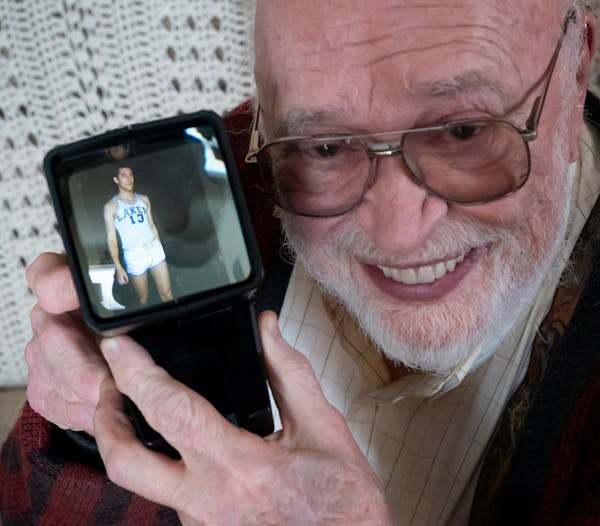In an era when basketball was firmly rooted to the ground, Myer "Whitey" Skoog soared.
The son of Norwegian immigrants, Skoog began playing schoolyard basketball in Brainerd, Minn., where he perfected an odd-looking shot that had other players and coaches shaking their heads in dismay.
Because he jumped.
Skoog eventually took his jump shot to the University of Minnesota, where he earned All-America and All-Big Ten honors, and then to the Minneapolis Lakers, where he won two NBA titles.
Skoog, 92, died Thursday morning in St. Peter, Minn., where he took the job coaching men's basketball at Gustavus Adolphus College after a back injury forced him to retire from the Lakers at age 29.
His son, Dave Skoog, said his father broke a hip two weeks ago. Although surgery was successful, he never recuperated.
Though Skoog is best remembered for his basketball career, it doesn't define him, his son said.
"I guess what it boils down to is, basketball was not his life," Dave Skoog said. "The biggest thing for him was helping boys become men. Coaching and teaching.
"He came from very humble beginnings, and he remained a very humble person. Just the kind of guy you want to call 'Dad.' "
Skoog's parents weren't thrilled with their son's early athletic career, he said last month in an interview with the Star Tribune for a story about the Minneapolis Lakers.
"I came from a Norwegian family, and they didn't think much of paying somebody to play with a little round ball," Skoog said with a chuckle.
Bud Grant, the former Vikings coach, played basketball with Skoog at the U.
"I'll tell you what, he was a competitor," Grant said. "When I played with him at the university, he was our featured guy.
"He perfected the jump shot and a lot of our offense was, we'd come down the floor and set up screens so he could shoot that jump shot."
Befitting his Norwegian heritage, Skoog in his youth was an accomplished ski jumper, Dave Skoog said.
"He could have been an Olympic ski jumper," his son said. "But the Gophers and the Lakers frowned upon that."
He also excelled at baseball and tennis. He took up golf at age 40 and within a year was a scratch golfer, his son said.
That led to his adding golf to his Gustavus coaching duties. His teams won their conference title 17 times in his 22 years, and in 2014 he was inducted into the Golf Coaches Association of America Hall of Fame.
Skoog's shooting style quickly spread throughout the NBA as players abandoned the old two-handed set shot in favor of the jumper, helping make the NBA the high-flying game it is today.
Scholars of basketball have written books about the birth of the jump shot, and Skoog is always mentioned as one of the pioneers. A chapter was devoted to him in John Christgau's 1999 book, "The Origins of the Jump Shot: Eight Men Who Shook the World of Basketball."
According to that book, Skoog's first jumper came when he instinctively jumped to shoot over a taller opponent in a high school game between Brainerd and Bemidji. But in his recent interview, Skoog insisted that he first used the shot at Lowell Elementary School, calling it "the first jump shot documented."
Whatever its origins, it would forever be associated with him.
At the U, where a banner honoring Skoog's retired No. 41 hangs in the rafters at Williams Arena, athletic director Mark Coyle offered condolences.
"Whitey Skoog is one of the all-time Gopher greats, and his family is in our thoughts," Coyle said. "We are appreciative of his contributions to basketball in Minnesota and to the game as a whole, and saddened by his passing."
Skoog had a long and fruitful career after his playing days ended, becoming a revered figure on the Gustavus campus and in the town of St. Peter.
"When I think of Whitey, I think of class and poise," said Gustavus men's basketball coach Mark Hanson, who played for Skoog for two years and went on to break his former coach's win record. "He never told you that he was going to teach you something, he just led by doing and humbly modeled how to be a gentleman."
But Skoog never forgot the thrill of competition.
Asked in the interview weeks before his death whether playing in the early NBA was fun or more like a job, Skoog smiled.
"I'd like to have had that job the rest of my life," he said.
New Minnesota GOP leaders seek peace with party's anti-establishment wing

Who is Republican Lisa Demuth, Minnesota's first House speaker of color?

Minnesota House GOP, Secretary of State Steve Simon return to Supreme Court
Supreme Court sides with DFL and Simon, says 68 House members needed for floor action

